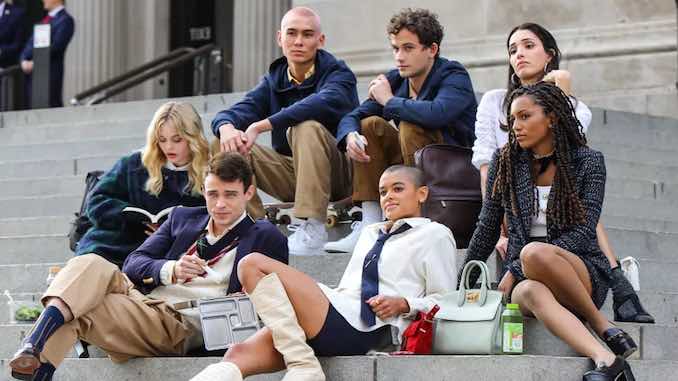HBO Max’s Gossip Girl Reboot May Be Too Woke for Its Own Good
Photo Courtesy of HBO Max
The CW’s iteration of Gossip Girl, which aired on the broadcast network from 2007 to 2012, introduced a closet full of fashion trends, freaked out the PTC, brought a conversation about cyberbullying to the mainstage, and helped make stars out of the likes of leads Leighton Meester and Blake Lively, who played frenemies Blair Waldorf and Serena van der Woodsen.
It also had Dorota.
Originally introduced as a housekeeper meant to be a stoic confidant to Meester’s ultra-competitive poor little rich girl, Dorota Kishlovsky also came to represent so many fans of the show who were watching at home. With bug eyes and a knack for one liners (“You don’t come to me with any complaints about anything. You too happy. Content. I’m worried you join cult”), actress Zuzanna Szadkowski’s secondary character was the comic relief outlet for a show that reveled in camp meant for an older generation, but that still wanted to fit into the teen soap genre.
Dorota became so ingrained in the world of the original Gossip Girl that, upon its finale, even then-mayor Michael Bloomberg was apparently shocked to learn that she wasn’t the mysterious titular blogger who had been spilling tea about Manhattan scions for six seasons.
In the new iteration of Gossip Girl, which premieres July 8 on HBO Max, there is no Dorota.
What there is instead is a different, modern-day look at what it means to be wealthy and entitled in the Gen Z era where everyone is just accustomed to knowing everyone else’s business, and the most popular girl at school is also an Instagram influencer drowning in SponCon.
Center to the story is Jordan Alexander’s Julien Calloway. The first Gossip Girl had Blair constantly intimidating her minions and defending her throne from Serena, who most of the time didn’t even want it anyway. Here, no one really challenges JC for her seat at the top of the Met steps. Instead, she acts the part of a nice and approachable person while letting her (much more intimidating) lieutenants, Zión Moreno’s Luna and Savannah Smith’s Monet, do the dirty work. She’s the only one of the crew who seems to be considerate to the teachers and she’s not particularly threatened by new girl Zoya (Whitney Peak)—although maybe she should have been. Julien’s only true friend seems to be Audrey (Emily Alyn Lind) who, when bothering to look up from her copy of Black Swans, will tell her hard truths like that she’s better off without her ex-boyfriend.
As a reflection of their real-life Gen Z peers, this version of Gossip Girl is more open about the importance of activism, racial diversity, and queer representation (streaming on a premium paid service versus a broadcast network helps get the latter point across). Thomas Doherty’s slimy, sexually fluid pill-popping Max Wolfe is the new version of Ed Westwick’s smarmy Chuck Bass and his daddy issues. Evan Mock’s oft-confused streetwear enthusiast Aki is an update to Chace Crawford’s blank-starring Nate Archibald. And Eli Brown’s curly haired and perfectly disheveled Obie is a much, much wealthier and woke take on Penn Badgley’s Dan Humphrey. The new show’s trademark opening refrain has even become more inclusive, with Gossip Girl increasing her range to offer a greeting to more than just Upper East Siders and promising to uncover the “truth behind the scandalous lives of New York’s elite.” Because, in the digital age and a swath of New York private school students causing troubles, the other four boroughs now carry as much weight as Manhattan.
Characters plainly talk about sexism and inherent privilege and what they’re going to do about it. Obie feeds the workers on the picket lines who are striking against his family’s real estate deal. Zoya wonders why the school has to hold a black tie fund-raiser for lesser-funded art programs instead of just donating money directly to them. In the same breath as they tell Julian to “fuck the patriarchy,” Monet and Luna tell her that her stock will plummet if she doesn’t find a new paramour after her boyfriend dumps her.